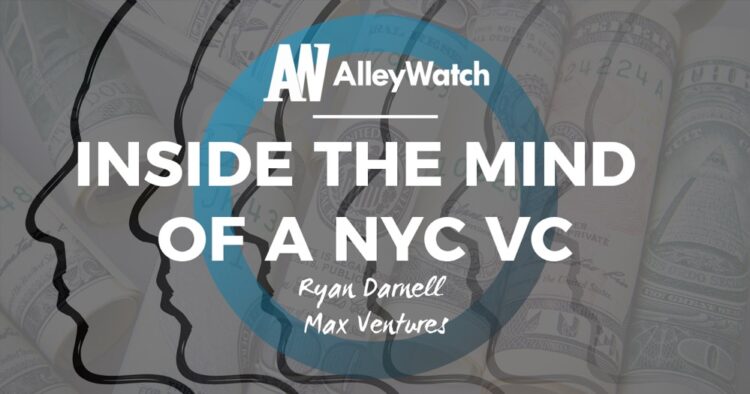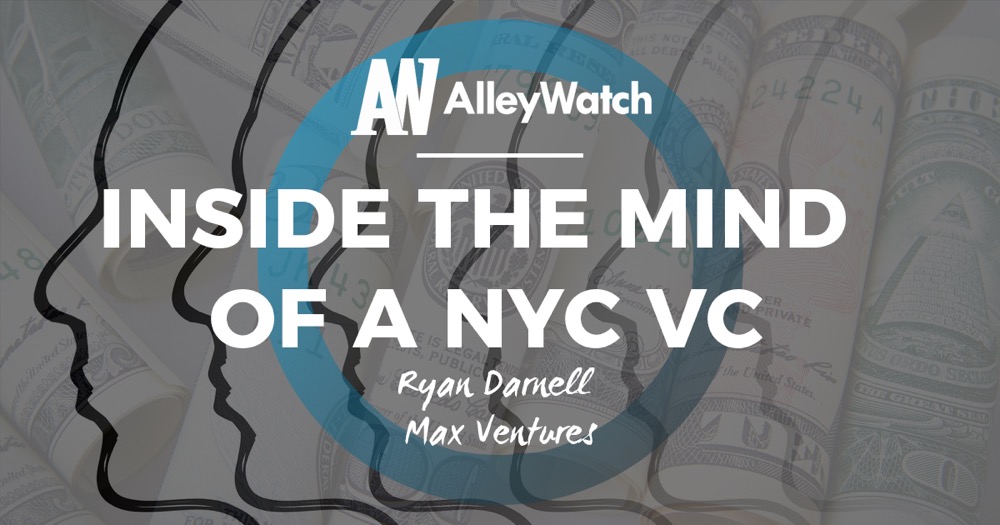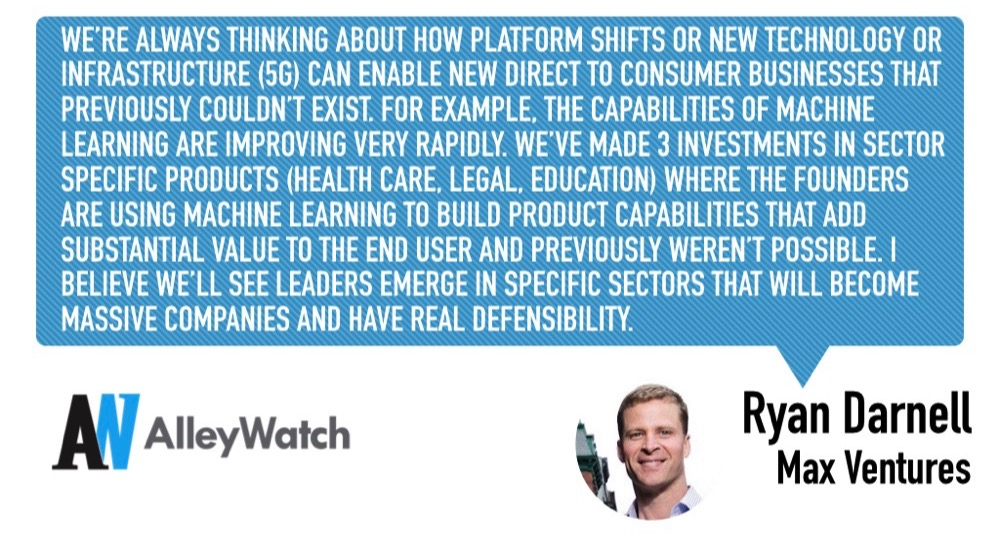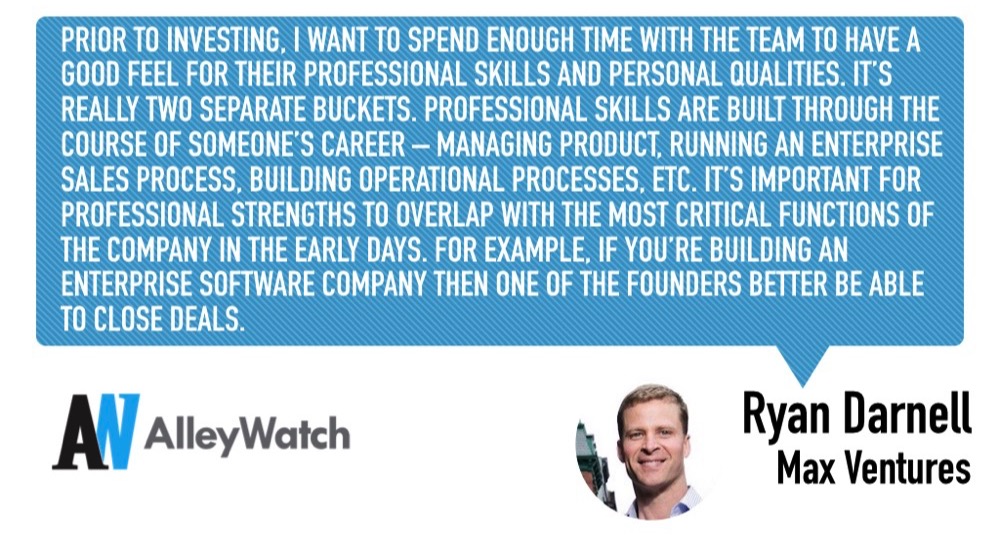Welcome back to Inside the Mind of an NYC VC, a highly acclaimed series at AlleyWatch in which we speak with New York City-based Venture Capitalists. In the hot seat this time is Ryan Darnell, Founding Partner at Max Ventures, an early stage NYC venture firm founded in 2013. Currently investing out of its second fund, the firm has over 35 investments in companies including Ollie, Drone Racing League, Button, Boxed, and Raden. To date, the firm has seen five reported exits including the recent sale of Eloquii to Walmart. We visited Ryan at the Max Ventures’ office in Soho to discuss his path to venture, Max Ventures’ thematic approach to investing including its interest in digital commerce, how Ryan and his team serve as value-add investors, changes in the investment landscape, tips for entrepreneurs to successfully navigate the funding process, and much, much more including how to run a venture firm while balancing family responsibilities.
If you are a NYC-based VC interested in participating in this series, please send us an email. We’d love to chat. If you are interested in sponsoring this series that showcases the leading minds in venture in NYC, we’d also love to chat. Send us a note
Reza Chowdhury, AlleyWatch: Please tell us a little bit about your background, how you started in venture, and how you got to where you are today.
Ryan Darnell, Max Ventures: I got my first taste of early-stage consumer businesses while incubating a rum company for a celebrity musician back in 2011. I was very fortunate because I spent a year working on it with someone who previously started several companies and another person who was a CMO at a major shoe brand. I learned important lessons about building a brand system from the ground up.
In 2012, I moved to NYC and started working for a private equity company. I became very close with the Stenbeck family who was the PE group’s largest investor. The family, originally from Sweden, was deeply involved with digital commerce platforms that were rapidly expanding in markets outside of the US. We studied the US market closely and decided to start an early-stage VC firm in late 2013.
Fund I at Max Ventures was backed by a single LP and Fund II is backed by several LPs. Tell us about the decision to expand the investor base. Has your role changed as a result?
In the first fund we had a clear focus and really wanted to prove 3 things:
- We can get access to the best companies
- We can make good investment decisions based on our access
- We can add value post-investment and build a good reputation with founders
We made 27 investments in the first 3 years and felt good about what we accomplished. In 2017 we decided to raise an outside fund and bring on new investors who believed in our long-term goals. Raising the first outside fund is always difficult and time-consuming, but I’m very happy with the LP base we’ve built.
As a single GP, my role hasn’t necessarily changed much as an investor. The biggest difference is I spend more time now thinking about the firm I want to build over the next 10-15 years.
 Do you consider the strategic value that LPs offer to your portfolio company?
Do you consider the strategic value that LPs offer to your portfolio company?
Yes, LPs can add strategic value in several ways, especially when raising your first outside fund. For example, we have an LP who has a multi decade reputation for backing managers very early in their careers who have gone on to be very successful. Having them as a LP creates a very positive signal for other LPs who are considering an investment. We’re also fortunate to have personal investments from a few very accomplished VCs who have been on the Midas List, which also helps with signaling. We also have a strategic LP who is a large multi-brand retailer in Europe. They have become closely involved in a retail tech startup we’re working on and have agreed to be the first enterprise customer.
How has tech in NYC evolved since you started? Any observations – what do we do well and what do we need to improve on?
When we started investing in late 2013, there were only a few firms based in NYC and everyone knew each other. The ecosystem has expanded dramatically since then and is clearly the 2nd biggest ecosystem in the US.
When thinking about what we do well, the New York ecosystem is a diverse group of investors and founders. It’s not perfect, but if you look at who is making investment decisions at the earliest stages, the balance is much better than the Valley,
Is there a specific investment thesis that Max Ventures deploys? Where is the firm’s sweet spot?
We want to invest as early as possible. I love working with founders during the creation process when ideas are just starting to become fully baked. We started working with several founders in our portfolio months before they started a fundraising process. I want to be the best at helping companies during the first 12-24 months of a company’s life.
I spend most of my time focusing on NYC and Europe (specifically Nordics) and 70-80% of our investments are based in one of those regions. We’ve built a lot of resources in NYC that are also very helpful to founders based in Europe. Over the next decade, startup ecosystems across Europe and NYC will become much more connected.
From a thematic standpoint, digital commerce has always been a big focus area. We define digital commerce as any digital first business that involves a transaction with the consumer. We’ve invested in direct-to-consumer vertical brands, marketplaces, and horizontal platforms in almost every industry, including CPG, health care services and products, financial services, transportation, food, real estate, and fashion. We’ll invest in other sectors when we meet founders that we really want to invest in, but digital commerce has been the biggest focus area.
We’re always thinking about how platform shifts or new technology or infrastructure (5G) can enable new direct to consumer businesses that previously couldn’t exist. For example, the capabilities of machine learning are improving very rapidly. We’ve made 3 investments in sector specific products (health care, legal, education) where the founders are using machine learning to build product capabilities that add substantial value to the end user and previously weren’t possible. I believe we’ll see leaders emerge in specific sectors that will become massive companies and have real defensibility.
I also think there’s a good chance you something similar in blockchain where vertical specific direct to consumer companies are built from the ground up with a decentralized architecture. It’s difficult now because the underlying infrastructure and services to facilitate these businesses are still being developed, but it’s improving rapidly.
Will Max Ventures lead?
Yes – we typically lead 2-4 investments per year and will invest in another 4-6 companies alongside another firm that’s leading.
The firm is increasingly looking at opportunities in Europe and has made a number of investments there already. Tell us about the decision to establish beyond the US footprint.
Yes – we’ve made two investments in Sweden this year and plan to make 3-4 investments in Europe per year moving forward. I’ve spent a lot of time in Europe, specifically Sweden, over the last few years and have seen the European startup ecosystems expand from the ground up. I’ve been extremely impressed by the quality of the founders. My partner’s family has a history of building successful businesses in Europe, which also helps.
Looking at the bigger picture, the NYC, Stockholm, Berlin, and London tech ecosystems have basically been built from the ground up over the last decade. At the same time startups are expanding outside of their home countries at a much earlier stage, especially in certain European markets like Sweden where the population in the home country is small. As a firm, you can create a lot of value by investing at an early stage and helping founders access resources across different ecosystems, serving as the connective tissue.
With that said, you have to be very committed and have a long-term approach to investing in any market outside of your home market. It takes time and a lot of effort to build a brand in a new market.
How has the venture market evolved since you started investing? Do you foresee any other changes in investment strategy as a result?
Yes, the market has changed quite a bit. The obvious answer is the number of firms and fund sizes for the successful funds has increased dramatically. But what you’re starting to see now and will become more obvious over the next 5 years is LP money moving away from legacy VC brands who haven’t made a successful generational transition to new brands who have built a very strong track record and reputation with founders. Younger founders care less about the history of the firm and more about how relevant they are now and the partner they know.
But what you’re starting to see now and will become more obvious over the next 5 years is LP money moving away from legacy VC brands who haven’t made a successful generational transition to new brands who have built a very strong track record and reputation with founders. Younger founders care less about the history of the firm and more about how relevant they are now and the partner they know.
When thinking about our investment strategy, I try not to worry about what everyone else is doing. I’m focused on what we can do extremely well that will create value for founders and drive the best returns for LPs. You have to optimize for both.
What are you excited about right now, from an investment standpoint?
I’ve spent a lot of time in the last two years learning more about the health care industry. It’s a very complex system that is inefficient and full of incentives that don’t make sense. There is also a lot of money flowing through the system, as it accounts for over 18% of GDP. In the coming decade, there will be several new health care companies built from the ground up that deliver a superior user experience or product in specific verticals and decrease costs for the consumer. We’ve made early investments in K Health, PlateJoy, HeartBeat Health, and Uniform.
What does being a Max Ventures portfolio company mean for founders? What can they expect?
As I mentioned earlier, I love the first 12-24 months in a company’s life. All the knowledge and resources we’ve built go towards helping a company in that time period. We’re going to be engaged and work extremely hard when we have a chance to help.
Imagine this – an entrepreneur has courted you and you haven’t committed to the deal yet. When you are ready to pull the trigger and offer a term sheet, you find out that the round is filled. What are your initial thoughts and what do you do as a firm to ensure that this does not happen again?
As an organization, it’s important to run an efficient process when you’re interested in a company. We definitely have situations where we want to invest in a company and the round is very competitive. When that happens, I have an honest conversation with the founders and tell them exactly why I think we would be a great investor specifically for their company. I urge them to speak to founders we’ve previously backed and take time to optimize the investor syndicate. If we can get to founder references, we almost always receive an allocation in the round. With that said, it’s important not to bash other investors in the heat of the moment. Compete on your own merits and play the long game. That will ultimately ensure others in the ecosystem will want to work with you long term.
What do you need to see from teams, both qualitatively and quantitatively, in order to invest?
It’s funny, I grew up playing in very competitive summer baseball leagues. My dad was one of our coaches and he was formerly a major league scout. We used to go to games together and watch a team play before we played them. We would create a scouting report that listed the player’s physical skills and weaknesses, e.g., has trouble hitting a curve ball. But we would also observe the player’s personal qualities – how they react in high-pressure situations, etc. I viewed it at the time as fun, but it actually created a mental framework to separate the analysis of those two different categories at a young age.
Prior to investing, I want to spend enough time with the team to have a good feel for their professional skills and personal qualities. It’s really two separate buckets. Professional skills are built through the course of someone’s career – managing product, running an enterprise sales process, building operational processes, etc. It’s important for professional strengths to overlap with the most critical functions of the company in the early days. For example, if you’re building an enterprise software company then one of the founders better be able to close deals.
Regarding personal skills, it varies for every investor. I personally overvalue people who are transparent; work extremely hard; have a track record of overachieving at whatever they’ve previously worked on; and have the ability to convince other people of their point of view, which helps with hiring, future fundraising, getting strategic partners to work with you, etc. I really don’t care about where you went to college or where you grew up.
What can entrepreneurs do to ensure that the relationship between the firm and companies is fruitful post investment?
First, both sides should have an in-depth conversation about how they will work together before closing the investment. Founders should engage their investor base regularly but in an efficient way. The best way to start is sending a regular monthly report. Include good news, negative news, any learning, and areas where an investor can help now.
It’s also important to be very transparent about how the company is performing. Starting a company from the ground up is very hard and experienced investors know things very rarely go as planned. Be transparent about the positive and negative news. Even the most successful companies have a lot of tough moments along the way.
Quick Hits:
Who do you admire in the startup world and why?
Benchmark Capital. Outside of achieving the best returns in the industry; they are patient, disciplined, extremely smart, and run their own playbook, regardless of what other firms are doing. Also, they don’t spend a lot of resources marketing themselves. They let other people do the talking for them.
What’s the last book you read?
An American Sickness – a really good book about our health care system.
What are your tips for running a VC firm while having small children?
Become great at prioritizing your time. I make a point to spend time with my kids every day, which means I sacrifice any personal hobbies outside of work. I typically wake up around 5:3oAM and either read or workout. My kids wake up around 7 and I spend time with them until I leave for work at 8:30. I try to get home by 6:30 if I don’t have a work dinner and spend time with my kids until they go to bed at 8:30. Then I go back to work until 10:30 or 11, and then try to sleep.
It’s not ideal, but I travel quite a bit. I’m in Europe 6-8 times per year and on the west coast at least once per quarter. Thankfully, I have a supportive family and love what I do, otherwise, it definitely wouldn’t be worth it.
What’s your favorite fall activity in NYC?
Anything outside with friend and family.






